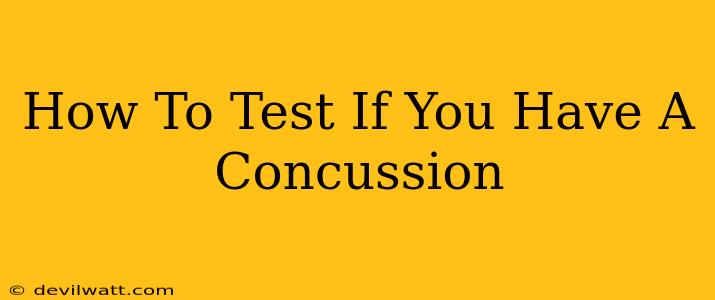A concussion is a type of traumatic brain injury (TBI) caused by a bump, blow, or jolt to the head or body that causes the brain to move rapidly back and forth inside the skull. This can cause chemical changes in the brain, leading to a range of symptoms. Knowing how to recognize the signs and performing simple self-tests is crucial for early diagnosis and treatment. While this article provides information, it's essential to seek professional medical attention if you suspect a concussion. Self-diagnosis is never a substitute for a doctor's evaluation.
Understanding Concussion Symptoms: More Than Just a Headache
Concussions aren't always obvious. Symptoms can vary widely from person to person and may not appear immediately after the injury. Some common signs and symptoms include:
- Headache: This is often a prominent symptom, but it's not the only indicator.
- Dizziness or balance problems: Difficulty walking, feeling unsteady, or experiencing vertigo.
- Nausea or vomiting: Feeling sick to your stomach.
- Sensitivity to light or noise: Experiencing discomfort in brightly lit or noisy environments.
- Blurred vision: Difficulty focusing or seeing clearly.
- Confusion or disorientation: Feeling lost or unsure of where you are or what's happening.
- Memory problems: Difficulty remembering events before or after the injury.
- Concentration problems: Struggling to focus on tasks.
- Fatigue: Feeling unusually tired or sluggish.
- Emotional changes: Irritability, sadness, anxiety, or mood swings.
- Sleep disturbances: Difficulty sleeping or sleeping too much.
The Severity of Symptoms Varies
It's important to remember that the severity of concussion symptoms doesn't always correlate with the severity of the injury. A person might experience mild symptoms that resolve quickly, or they might have more severe symptoms that persist for weeks or even months.
Simple Self-Tests for Concussion
While these tests can offer clues, they are not a substitute for professional medical evaluation.
1. The Balance Test: Standing on One Leg
Try standing on one leg with your eyes closed for 20 seconds. Difficulty maintaining balance could indicate a concussion.
2. The Memory Test: Recalling a Series of Words
Ask someone to read you a list of five unrelated words. After a short delay (a few minutes), try to recall as many words as possible. Difficulty remembering could suggest a concussion.
3. The Concentration Test: Serial Sevens
Start at 100 and subtract seven repeatedly. Difficulty completing this task swiftly and accurately could be a sign.
4. The Reaction Time Test: Catching a Falling Object
Ask someone to drop a small object (like a pen) and see how quickly you can catch it. Slower reaction time than usual might suggest a concussion.
When to Seek Immediate Medical Attention
It's crucial to seek medical attention immediately if you experience any of the following:
- Loss of consciousness: Even for a brief period.
- Severe headache that worsens: Intense and unrelenting pain.
- Seizures: Sudden, uncontrollable muscle contractions.
- Vomiting: Repeated episodes of vomiting.
- Weakness or numbness in limbs: Loss of sensation or motor function.
- Pupil dilation: Unequal pupil sizes.
- Changes in speech: Slurred speech or difficulty speaking.
- Deteriorating symptoms: Symptoms that worsen over time.
Post-Concussion Management: The Road to Recovery
Following a concussion diagnosis, your doctor will likely recommend rest and gradual return to activities. Avoid strenuous physical activity, screen time, and mentally demanding tasks until cleared by a medical professional. This gradual approach is crucial for optimal recovery.
Disclaimer: This information is for educational purposes only and does not constitute medical advice. Always seek the advice of a physician or other qualified health provider with any questions you may have regarding a medical condition. Never disregard professional medical advice or delay in seeking it because of something you have read on this website.

